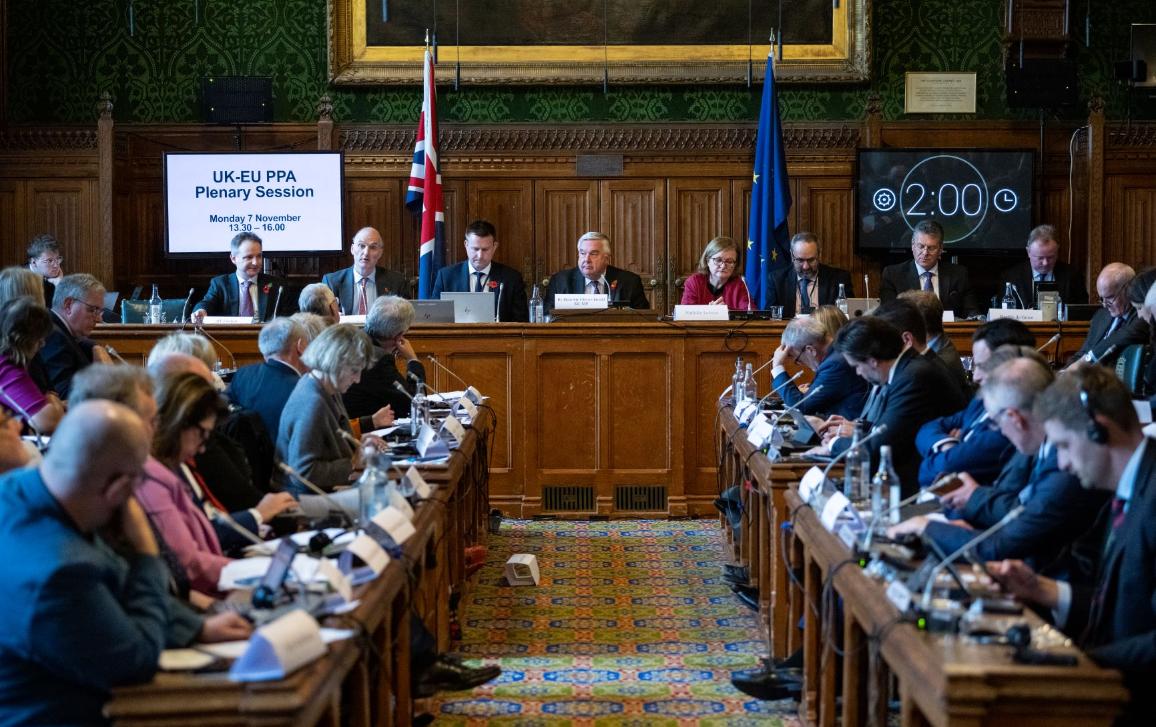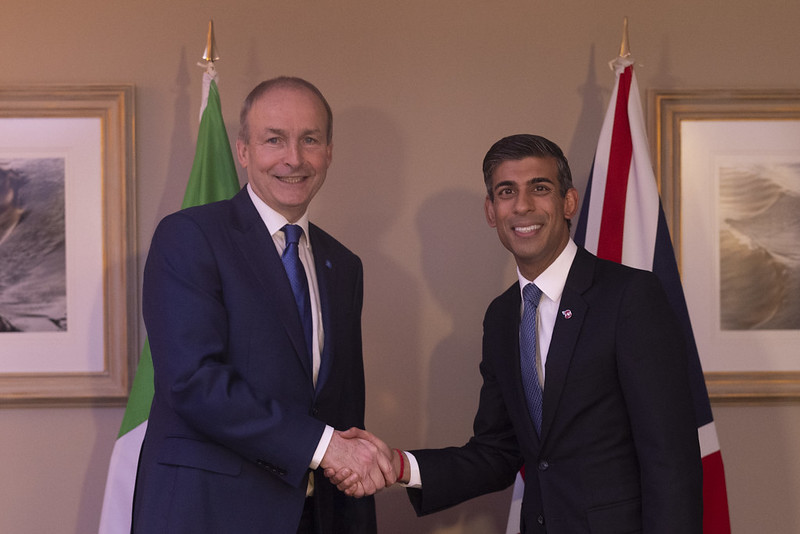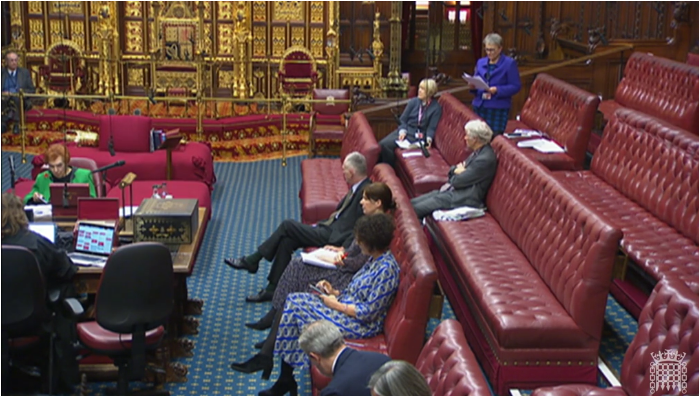Brexit & Beyond Newsletter
14 November 2022
Welcome to the 14 November 2022 Brexit & Beyond newsletter
This week’s newsletter considers the state of play in EU-UK relations, Protocol negotiations, and Northern Ireland politics. The EU-UK Parliamentary Partnership Assembly met in Westminster last week. The British-Irish Council met in Blackpool. The Northern Ireland Protocol Bill proceeds to report stage in the Lords, while the Retained EU Law Bill has started committee stage in the Commons.
EU-UK Parliamentary Partnership Assembly
The EU-UK Parliamentary Partnership Assembly (PPA) met for the second time on 7 and 8 November in Westminster. The PPA is a forum for the UK Parliament and the European Parliament to exchange views on the UK-EU Trade and Cooperation Agreement (TCA) [Read more information on the TCA and PPA]. Members of the Northern Ireland Assembly, Scottish Parliament and Senedd Cymru can attend the plenary meetings as observers. Declan Kearney (Sinn Féin) and Phillip Brett (DUP) attended from the Assembly.

The meeting of the EU-UK Parliamentary Partnership Assembly at Westminster | Source: European Parliament
UK Minister for Europe Leo Docherty addressed the PPA, saying that under the Protocol, "People in Northern Ireland have been deprived of equal treatment with people in the rest of UK on matters of VAT, subsidies and the right to vote on laws that apply to them". He said it is the UK's preference to resolve these issues through talks, adding that the UK Foreign Secretary James Cleverly and European Commission Vice-President Maroš Šefčovič have had “productive” meetings and have initiated further technical discussions. Minister Docherty indicated that he will visit Northern Ireland this week.
Vice-President Šefčovič focused his remarks on Northern Ireland. He said his team “remain committed to working constructively and intensively on joint solutions, as only those can create the legal certainty and predictability that people and businesses in Northern Ireland need and deserve.” Šefčovič said the 25th anniversary of the Good Friday (Belfast) Agreement “should galvanize us into resolute action”. On the EU-UK Trade and Cooperation Agreement, Šefčovič said “the UK is entitled to diverge from the EU…[but] more divergence means more friction and less trade – simple as that.” He said the UK’s NI Protocol Bill would “put Northern Ireland’s unique access to the EU single market at risk” and added, “This is surely the moment to abandon recourse to unilateral action.”
The PPA agreed a joint statement, calling for close cooperation and regular meetings between the UK and the EU, particularly in the coming months. The PPA also agreed a recommendation to the Partnership Council on energy cooperation.
Democratic deficit
Declan Kearney (Sinn Féin) made remarks to the PPA as part of a debate on relations between the PPA, civil society and the devolved institutions. He said there was a point of agreement between all parties in Northern Ireland - that there is a democratic deficit in how NI is treated regarding the PPA and the Protocol negotiations: “we have been locked out of having form of democratic consultation and engagement,” he said. Sir Jeffrey Donaldson (DUP) welcomed negotiations to find a solution on the Protocol and said he wants to see cooperation between the NI Assembly and Executive and the European Union, but that “without a resolution to the Protocol, such cooperation is not possible.” Jack O’Connor, member of the European Economic and Social Committee said the issue of a democratic deficit for Northern Ireland “was mentioned by every single group [they] met in Belfast” on a recent visit. Barry Andrews MEP (Fianna Fáil) said that while Northern Ireland had dominated discussions in the PPA, “two MLAs have had to sit silently throughout [these]”. He called for a mechanism to include MLAs in the PPA, or a sub-structure to involve NI parties.
State of Play: EU-UK talks
The outgoing EU Ambassador to the UK said in an interview with the Financial Times that the EU and UK are “not that far apart” on the Protocol. João Vale de Almeida said he is “encouraged” by PM Rishi Sunak’s early meetings with EU leaders. “There’s a new cycle in Britain and there should be a new cycle in UK-EU relations,” he commented. The Ambassador said, “There are always talks about talks and real talks — we are somewhere in between...We need now to focus on the landing zone.” Vale de Almeida said Brussels would work to make checks between GB and NI “as invisible as possible.” The EU wants to use real-time data from the UK to assess the risks. However, he said, “We can’t accept the situation where there are zero checks.” Vale de Almeida said the 25th anniversary of the Good Friday Agreement in April next year should be a “stimulus”, but was not a deadline for a deal. Tony Connelly of RTÉ tweets from Brussels that he suspects there won’t be an agreement by Christmas but suggests a ‘landing zone’ could “reflect more liberal interpretations of the Protocol, and a range of understandings over risk…which would ideally allow all sides to claim some sort of victory”. He notes that the UK has built a bespoke data monitoring system (giving the EU “a virtually real-time, forensic picture” into the movement of goods), which EU officials are currently testing. Meanwhile, Euractiv reports that EU officials have been told to decline meetings with UK counterparts, unless they are they are “legally mandatory”, relate to the implementation of the Withdrawal Agreement, or to the war in Ukraine.
State of Play: NI politics
Secretary of State for Northern Ireland Chris Heaton-Harris announced to the Commons on Wednesday that he will introduce legislation to extend the deadline for the Northern Ireland Executive to form, with the aim, “to create the time and space necessary for talks between the UK Government and the European Commission to develop, and for the Northern Ireland parties to work together to restore the devolved institutions as soon as possible.”
Responding to his statement, Sir Jeffrey Donaldson (DUP) said, “the only remaining part of that [New Decade, New Approach] agreement that has not been implemented and honoured by this Government is the most important one of all: restoring Northern Ireland’s place in the UK internal market.” Claire Hanna (SDLP) said, “We believe strongly and hope that a fair deal is available between the EU and the UK that will satisfy all people of all identities and all economic sectors...I believe that that is what the people of Northern Ireland want.” Heaton-Harris was asked if the Government remains committed to achieving the same outcome through negotiations as would be delivered through the Northern Ireland Protocol Bill. He gave a one-word response: yes.
Earlier, at question time on Wednesday 9 November, NI Office Minister Steve Baker said the £340 million funding of the trader support service to help traders process 2.3 million customs declarations for trade between Great Britain and Northern Ireland “vividly illustrates the problems with the Protocol.” Mr Baker also said the Government is committed to “maintaining dual market access…We want to restore the constitutional status of Northern Ireland while ensuring that market access.” Chris Heaton-Harris was asked by Sammy Wilson (DUP) whether he accepts that “we cannot improve on that [the Protocol] and we have to remove it.” Heaton-Harris responded, “Actually, I think there is a negotiated path where we can completely change how we deal with the Protocol, which would mean that it dealt with the issues of governance and trade and all the other practical issues that are causing legitimate concerns.”
British - Irish Council
On Thursday 10 November, the 38th British-Irish Council took place in Blackpool. The BIC was established in the Good Friday Agreement, and involves representatives of the Governments of Ireland, the UK, Northern Ireland, Scotland, Wales, Guernsey, the Isle of Man, and Jersey. Rishi Sunak, the first UK Prime Minister to attend a meeting since 2007, attended along with Michael Gove, Minister for Levelling Up, Housing and Communities, and Chris Heaton-Harris, NI Secretary. Representatives from the Northern Ireland Executive did not attend, as Ministers are no longer in place.

Prime Minister Rishi Sunak meeting Taoiseach Micheál Martin at the British-Irish Council | Source: Simon Dawson / No 10 Downing Street
PM Sunak held bilateral talks with Taoiseach Micheál Martin at the summit. The Prime Minister “stressed that the UK’s strong preference is for a negotiated solution with the EU [on the Protocol].” He said “any deal must solve the full range of issues caused by the protocol but hoped for flexibility and pragmatism.” The Taoiseach “welcomed that time and space had been given to make progress on the EU-UK negotiations on the NI Protocol and allow for pragmatic operational solutions.” He said, “People and businesses in Northern Ireland have been crystal clear that they want agreed solutions to the Protocol issues and now is the time to do so.” Sunak tweeted that their meeting was “very positive”.
The Prime Minister and Heads of Devolved Governments Council also met for the first time on Thursday. The Council was established to oversee intergovernmental relations and to consider policy issues of strategic importance to the whole of the UK.
Northern Ireland Protocol Bill
Bill proceeds to report stage
The Northern Ireland Protocol Bill's final day of committee stage was held on Monday 7 November. Baroness Ritchie urged the Government to put the Bill “into cold storage and ensure that there is renewed political vigour given to the [EU-UK] negotiations.” Lords Dodds (DUP) remarked, “You can imagine…that if there is such outrage about powers being given by Parliament to the Executive and UK Ministers [in this Bill], how citizens of Northern Ireland…feel about powers being not just taken from Parliament and given to Ministers but given to foreign officials of the European Commission to propose law.” Lord Purvis concluded that the Bill “has lipstick on now, and we have given it a nice frock, but it is still a pig of a law, and that has not changed. It is illegal, it is a power grab, and it will not work.”

Baroness Ritchie (right) speaking during the debate on the NI Protocol Bill | Source: UK Parliament
Legislative consent
Three committees in Senedd Cymru have reported on the Welsh Government’s Legislative Consent Memorandum on the NI Protocol Bill. The Legislation, Justice and Constitution Committee has recommended the Senedd withholds consent to avoid contributing to a breach of international law. The Culture, Communications, Welsh Language, Sport, and International Relations Committee is concerned about the impact on UK-EU relations, and cooperation between Wales and Ireland. Meanwhile the Economy, Trade, and Rural Affairs Committee highlights that the Bill “will incur unknown costs, particularly in relation to Welsh ports…it is unknown how these will be funded.”
The Scottish Parliament Constitution, Europe, External Affairs and Culture Committee reported on the Bill, noting the scope of the delegated powers in this Bill, along with those in other Bills related to the UK leaving the EU, “presents a significant risk to the balance of power between the Executive and the Legislature both at a UK and devolved level.” The Delegated Powers and Law Reform Committee also reported on the Bill.
Evidence on the Protocol and Protocol Bill
On Wednesday 9 November, the Lords Protocol on Ireland/Northern Ireland Sub-Committee heard evidence from Tom Kelly, Columnist at The Irish News, and Ben Lowry, Editor of the News Letter. Lowry said the Government’s approach to the legal case, soon to be heard in the Supreme Court, “really encapsulates the ambivalence, the uncertainty and the concerning nature for the many unionists who follow things closely”. He said, “it is really unclear where the UK Government are.”
On the Northern Ireland Protocol Bill, Kelly said rushing it through Parliament “would only further antagonise relations with Europe…slow things down, hit the pause button and allow the Prime Minister to do his job and inject some common sense back into the actual process.” Regarding the justification for the Bill, Lowry said, “On the principle of consent and the Belfast Agreement protecting minorities, there is no question but that there is a legal justification for radical change to the Northern Ireland Protocol, and that is pretty much widely accepted now.” Kelly referred to comments from Peter Mandelson, former Northern Ireland Secretary, who noted there are elements of the Protocol which “do not rest easily with the Belfast/Good Friday Agreement.” However, Kelly highlighted his further remarks that “overall the benefits of the Protocol outweighed any difficulties that it had in relation to the Good Friday Agreement.” He said, “The British Government, the Irish Government and the European Union have a responsibility to reassure unionists more forcibly about the constitutional guarantee in the Good Friday Agreement.”
Kelly said a deal between the EU and UK on the Protocol “will not cover everybody, but it will be the best deal, hopefully, that will cover most people.” Lowry said his concern would be that a deal reached quickly “would not match the rhetoric…with regard to protecting the Belfast Agreement.” He doesn’t think a deal is unlikely, but rather is concerned about whether it could “command support among the largest minority bloc, unionists.”
The Sub-Committee has published written evidence submitted to its inquiry into the Northern Ireland Protocol Bill, including from political parties, civil society, business groups and academics.
Retained EU Law
The Financial Times reports that Ministers have found 1,400 additional pieces of Retained EU Law in the National Archives. Previously the Government had tallied over 2,400 items of legislation, which would be reviewed or repealed under the Retained EU Law (Revocation and Reform) Bill. Conservative MPs, including former NI Secretary Teresa Villiers, have expressed concerns about the volume and lack of time for this work.
The first sitting of committee stage for the Retained EU Law (REUL) Bill was held on 8 November. The Public Bill Committee heard evidence from academics, legal experts and lawyers. Former First Parliamentary Counsel Sir Stephen Laws called the Bill “a useful way to force things to become better” and said it would make the law less obscure.
On the Bill’s implications for Northern Ireland, and its interaction with the Protocol, Professor Catherine Barnard of the University of Cambridge said the Bill contains “a rather general and ill-defined carve-out for Northern Ireland legislation”. She the Northern Ireland Protocol Bill would turn off a large amount of the EU legislation that applies in Northern Ireland under the Protocol, while other legislation e.g. on equality law and social policy would still apply. “You have this generic and rather vague exclusion in respect of Northern Ireland,” she said.
Dr Viviane Gravey of Queen’s University Belfast said, aside from the added complexity for NI, “in the absence of an Assembly or Executive, it will be harder for Northern Ireland to either participate in the retained EU law powers or to give any kind of oversight.” She said there is a big question of how the Northern Ireland Protocol Bill, and Retained EU Law Bill will work together: “I do not think anyone has an answer. Civil society and Government—Ministers and civil servants—in Northern Ireland have a lot of questions, and there are concerns that we are not getting answers or clarity from the UK Government on this.”
Other news
- The Lords Common Frameworks Scrutiny Committee has received a response from the Government to its report, ‘Common Frameworks: an unfulfilled opportunity?’. [More information on Common Frameworks]. The Government states that “finalising Frameworks without a Northern Ireland Executive is not possible.” It accepts that it should consider how the Northern Ireland Protocol Bill may impact the operability of Common Frameworks, which, it comments, “will be especially important… [if there is] a dual regulatory regime in Northern Ireland.” The Government also states that the Department for Business, Energy and Industrial Strategy (which oversees the REUL Bill) has confirmed that “all commitments required for the operation of the Protocol contained in retained EU law will be retained, along with those for other international obligations.”
- The Specialised Committee on Citizens’ Rights will meet on 17 November. It monitors the implementation and application of the EU-UK agreement on citizens’ rights, which protects UK nationals in the EU and EU citizens in the UK. The Independent Monitoring Authority and the European Commission will present annual reports on monitoring and complaints.
- In response to a question from Stephen Farry (Alliance), the UK Minister for Immigration states that under the UK’s new post-Brexit immigration rules, the long-term aim is that “all visitors and migrants to the UK will provide both their face and fingerprint biometrics under a single global immigration system. As part of the ETA [Electronic Travel Authorisation] application process, applicants will be required to submit their biometrics.” This would apply to those entering Northern Ireland from the Republic of Ireland, but not to British or Irish citizens. The Northern Ireland Human Rights Commission and the Equality Commission of Northern Ireland have previously raised concerns about the operation of the ETA in relation to Northern Ireland.




